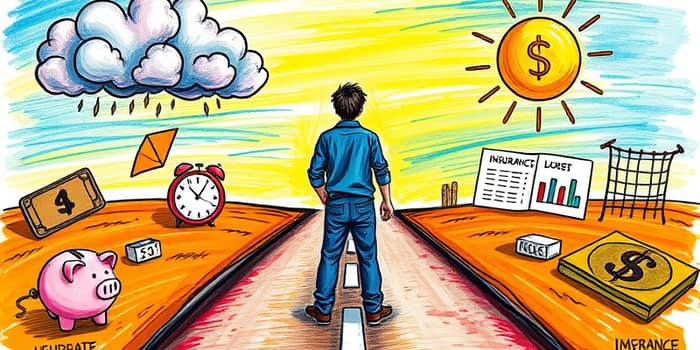Life can change in an instant, leaving even the most diligent planner scrambling to stay afloat. Whether it’s a sudden medical bill or job loss, having a plan ensures you won’t be overwhelmed by the financial tide. This guide walks you through building a comprehensive strategy to face turmoil with confidence and calm.
Building Financial Resilience
True resilience means anticipating change and adapting swiftly. It starts with recognizing that setbacks are not failures but opportunities to recalibrate and grow stronger.
By creating an adaptable financial defense strategy, you empower yourself to navigate unexpected challenges without derailing long-term goals.
Establishing and Growing Your Emergency Fund
An emergency fund is the cornerstone of any robust financial plan. Aim to save three to six months of living expenses in a liquid account. While this may seem daunting at first, even modest contributions add up over time.
Begin with a goal you can meet: setting aside $5 or $10 a week builds momentum and confidence. Over months, those small actions become a significant cushion that prevents you from resorting to high-interest debt.
Remember to keep your fund accessible. A high-yield savings or money market account offers both safety and a modest return. With this safety net, you can handle urgent needs without dipping into retirement accounts or emergency credit cards.
start with small consistent contributions to watch your savings grow steadily and securely.
The Role of Insurance in Crisis
Insurance is your financial parachute. It transfers risk away from your pocketbook, ensuring that a disaster—natural or personal—doesn’t become a lifelong burden.
Regularly reviewing and updating your policies guarantees coverage aligns with your evolving circumstances. Whether you add a new family member or relocate, adjusting your plan ensures you minimize the financial impact of crises without surprises.
Flexible Budgeting Strategies
A budget isn’t a straightjacket; it’s a roadmap that can and should shift as conditions change. Allocate funds for essentials first—housing, food, healthcare—then assign resources to savings and discretionary spending.
When a crisis hits, re-prioritize. Temporarily pause non-essential expenses—streaming services, dining out, travel—and redirect those dollars into your emergency fund or immediate needs.
flexible spending plan that adapts ensures you maintain control even when income fluctuates.
Managing Debt and Credit Health
Debt can be both a tool and a trap. High-interest balances drain resources and compound stress when funds tighten. Focus on paying bills on time and reducing credit card debt aggressively. If necessary, negotiate lower interest rates or extended payment plans with creditors.
A strong credit score unlocks access to emergency loans or lines of credit with favorable terms. Keep balances low, avoid opening unnecessary new accounts, and consider consolidating high-interest obligations into a single, manageable payment.
maintain a strong credit rating to ensure borrowing options remain available when you need them most.
- List balances and interest rates for all debts.
- Prioritize high-interest balances first.
- Set automated payments to avoid late fees.
Diversifying Income Streams
Relying on a single paycheck is risky. Explore side gigs, freelance opportunities, rental income, or dividend-yielding investments to broaden your financial base.
Each additional revenue source acts as a buffer, reducing the blow if one stream dries up. Even small earnings—from selling handmade crafts online to driving for a ride-share service—contribute to your overall stability.
multiple income streams for stability become especially valuable during economic downturns or sector-specific layoffs.
- Identify skills you can monetize part-time.
- Research passive income options like peer-to-peer lending.
- Reinvest extra earnings into your emergency fund.
Organizing Your Financial Assets
Disorder breeds stress. Keep all important documents—insurance policies, wills, account statements, tax records—in an organized system. Digital backups stored securely in the cloud, paired with physical copies in a fireproof safe, ensure you can recover swiftly after any disaster.
Maintaining an up-to-date inventory of your possessions accelerates insurance claims and prevents disputes. Document electronics, jewelry, and furnishings with photos and receipts.
Contingency Planning and Continuous Education
Don’t leave preparedness to chance. Draft an Emergency Financial First Aid Kit (EFFAK) that outlines whom to call, where accounts are held, and how to access funds quickly. Share this plan with trusted family members or advisors.
Finally, commit to lifelong learning. Attend webinars, read reputable personal finance books, and stay informed about changes in tax laws, insurance options, and investment products. Knowledge sharpens your response and deepens your confidence.
Leveraging Community and Government Resources
In times of dire need, local and national programs can offer vital relief. From unemployment benefits to disaster grants, familiarize yourself with eligibility criteria and application processes before you need them.
- Check local nonprofit financial counseling services.
- Track government disaster relief announcements.
- Follow reputable personal finance blogs and podcasts.
Conclusion
Unexpected financial setbacks are inevitable, but they need not be crippling. By establishing sound practices—building an emergency fund, securing appropriate insurance, maintaining a flexible budget, and diversifying income—you create a buffer that can absorb shocks without derailing your life goals.
Approach each step as part of a larger journey toward financial freedom. Start today: small actions compound into powerful safeguards. With preparation, resilience, and the right resources, you’ll face tomorrow with confidence and peace of mind.
References
- https://www.pbig.ml.com/articles/how-to-prepare-for-unpredictable-financial-events.html
- https://flourishwealthmanagement.com/resources/blog/planning-for-the-unexpected-building-a-resilient-financial-plan/
- https://www.cfal.com/blog/overcoming-financial-setbacks-strategies-for-building-resilience-and-success
- https://soundincomestrategies.com/blog/managing-financial-setbacks-6-steps-to-help-you-get-back-on-track/
- https://www.ussfcu.org/media-center/senate-cents-a-financial-wellness-blog/blog-detail.html?title=navigating-financial-uncertainty-how-to-plan-for-unexpected-life-events
- https://www.financealliance.io/tips-to-allocate-budget-across-departments/
- https://www.investopedia.com/articles/pf/11/prepare-for-a-financial-crisis.asp










